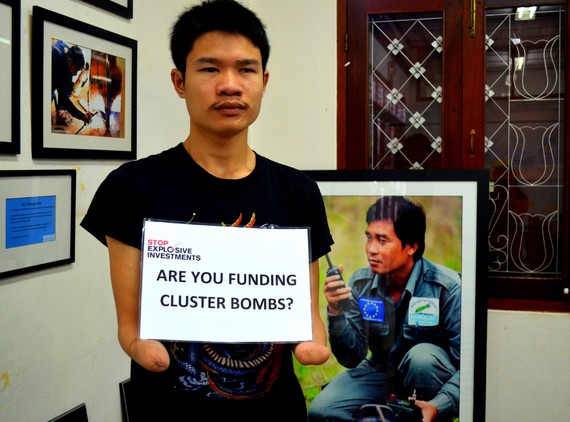The bomb fell over there. If you like, I can show you the crater. It exploded and shattered the window. [My wife] was standing next to the window. The fragments shattered the window and cut her carotid artery. I wanted to run in the opposite direction, but I heard people screaming, "Uncle Vanya! Uncle Vanya! Aunt Raya was killed!"
In October 2014, in eastern Ukraine, Ivan described his wife's death to Human Rights Watch in terms that were in some ways quite clinical yet also very desperate.
One wonders what Ivan is doing now, what support he is getting to cope with the loss of his wife, and whether those who launched the cluster munitions that killed Raya are aware that the weapon is internationally banned by the majority of the world, and that it should never, under any circumstance, be used in modern warfare. One also has to ask who gave the orders for this weapon to be used. Governments and the Office of the United Nations High Commissioner for Human Rights are pressing for answers on this recent use of cluster munitions in Ukraine.
This week campaigners against the weapon are also pressing for answers on why any financial institution or bank would choose to be associated with the production of this banned weapon. PAX, a member of the international Cluster Munition Coalition, has released a report revealing the financial institutions backing companies involved in production of cluster munitions.
Sadly, loss of life and limb from cluster munitions is not unusual. Fifty years since they were used in Laos, people still suffer from the daily threat of cluster munition remnants. Some have said that the U.S. bombing of Laos was the equivalent of one planeload of cluster bombs every eight minutes, 24 hours a day, for nine years. At least 270 million cluster bomblets were dropped as part of the campaign, and approximately 80 million failed to detonate. It's because of the devastating failure rate as well as the impact on civilians at the time of use that cluster munitions are banned under the 2008 Convention on Cluster Munitions. Cluster Munition Monitor records that civilians account for 94 percent of cluster munition casualties.
What is increasingly unusual is countries still using the weapon. Since the international ban was agreed upon, use has been limited to a small number of states remaining outside the global ban on cluster munitions, states such as Syria, which has shown little regard for international humanitarian law across the board. Each incident of use has been followed by strong international condemnation and usually denial by the states in question, showing a clear desire to disassociate themselves from this discredited weapon.
While production of cluster munitions also has been drastically reduced (18 countries including the UK, Australia, France, Germany, Japan and South Africa have ceased production), it continues to be tolerated in some countries remaining outside the global ban. Seven producers have been researched in the PAX report, from China, Singapore, South Korea and the United States. Financial investments in these seven producers, between June 2011 and September 2014, amount to US $27billion -- that's more than double the GDP of Laos, the country with more cluster munition casualties than any other.
Alarmingly, some of the financial institutions investing in cluster munition producers are based in countries that have already joined the Convention on Cluster Munitions. This raises ethical and legal concerns in countries that should abide by the treaty's prohibitions (including Article 1.1.c, which prohibits assisting "in any activity prohibited to a State Party under this Convention" -- which includes production).
Tolerating investment in cluster munition producers goes against a strong international stigma, and against the norms of international humanitarian law established by the global ban. It's time the UK, Australia, Canada, France, Germany, Japan, Spain and other countries that have joined the global ban on cluster munitions regulate the practice of these bad banks to ensure they are not supporting the overseas production of weapons they have already outlawed.
For every cluster munition produced, for every cluster munition used, for every cluster munition that fails to detonate, a civilian, like Ivan's wife Raya, is at too great a risk from death or injury. It's time we ask our banks to put lives before profits, and it's time for governments to put an end to this practice by introducing legislation to stop explosive investments.
Phongsavath Manithong, cluster munition survivor and Handicap International Ban Advocate, Laos (© Handicap International Laos)
